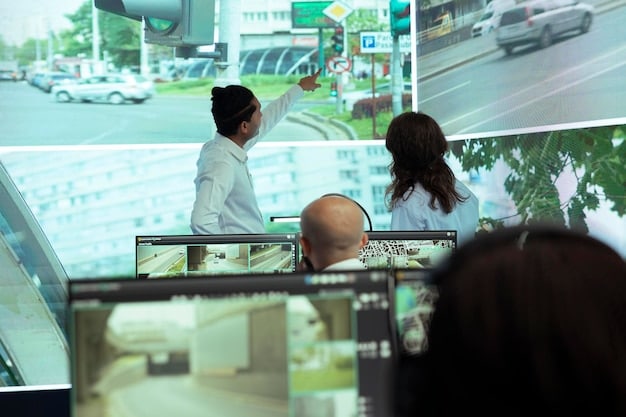Smart City Governance: Best Practices for 2025 & Beyond

Smart city governance in 2025 emphasizes data-driven decision-making, citizen engagement through digital platforms, and enhanced cybersecurity to protect urban infrastructure and residents’ privacy, ensuring sustainable and inclusive urban development.
The concept of the smart city has evolved from a futuristic ideal to a tangible reality, with cities around the globe leveraging technology to enhance urban living. As we approach 2025, effective smart city governance is crucial for ensuring that these technological advancements translate into real benefits for citizens. This article explores the best practices for policy development and citizen engagement in smart cities, focusing on strategies that promote inclusivity, sustainability, and resilience.
Understanding the Evolution of Smart City Governance
Smart city governance has come a long way. Initially, the focus was primarily on technological deployment, but now, the emphasis is shifting towards holistic strategies that integrate technology with community needs and values. This evolution reflects a growing understanding that technology alone cannot solve urban challenges; effective governance is essential for maximizing the positive impact of smart city initiatives.
From Technology-Centric to People-Centric Governance
The early stages of smart city development were often characterized by a top-down approach, where technology solutions were implemented without sufficient consideration of citizen needs or preferences. However, leading cities have recognized the importance of involving citizens in decision-making processes and tailoring solutions to address specific local challenges.
- Prioritizing citizen feedback in the design of new services.
- Creating accessible platforms for public participation and dialogue.
- Investing in digital literacy programs to ensure that all citizens can benefit from smart city technologies.
The Role of Data in Informed Decision-Making
Data is the lifeblood of smart cities, providing valuable insights into urban trends and challenges. However, the effective use of data requires robust governance frameworks that protect privacy, promote transparency, and ensure that data-driven decisions are aligned with community values. Data governance strategies are essential for maintaining trust and accountability in smart city initiatives.

Modern governance frameworks recognize the need for more proactive approaches when using data, this ensures that the technologies driving our cities are used to their maximum potential while mitigating potential risks.
In conclusion, the evolution of smart city governance reflects a broader shift toward more human-centric visions of urban development. By prioritizing citizen engagement, data-driven decision-making, and collaborative partnerships, cities can create truly smart and sustainable communities.
Key Pillars of Effective Smart City Policy Development
Developing effective policies is essential for ensuring the success of smart city initiatives. These policies should be based on five key pillars: inclusivity, sustainability, resilience, innovation, and security. When policies are developed, these key concepts are crucial to the development and success of our cities.
Inclusivity: Ensuring Equitable Access to Smart City Benefits
Inclusivity is a core principle of smart city governance, ensuring that all residents, regardless of their socioeconomic status, age, or background, have access to the benefits of smart city technologies. This requires addressing the digital divide, promoting digital literacy, and designing services that are accessible to individuals with disabilities.
- Implementing affordable broadband programs to bridge the digital divide.
- Offering digital literacy training to help residents navigate smart city platforms.
- Designing accessible interfaces and services for individuals with disabilities.
Sustainability: Promoting Environmental Stewardship and Resource Efficiency
Sustainability is another key pillar of smart city policy development, focusing on strategies that reduce environmental impact, conserve resources, and improve the quality of life for future generations. This includes promoting renewable energy, optimizing waste management, and investing in green infrastructure.
Sustainability should also be a motivator to innovation and creative ideas. As more cities strive to become environmentally responsible, it only makes sense that these efforts lead to new ideas.
Resilience: Building Robust Infrastructure and Adaptive Capacity
Smart cities must be resilient to a variety of shocks and stresses, including natural disasters, cyberattacks, and economic disruptions. This requires investing in robust infrastructure, developing contingency plans, and fostering adaptive capacity within communities. Resilience-focused policies can help cities withstand challenges and bounce back quickly.
Innovation: Fostering Collaboration and Experimentation
Smart city policy development should promote a culture of experimentation, where new solutions are tested and scaled up as appropriate. By encouraging innovation, cities can accelerate the development of cutting-edge technologies and strategies that address evolving challenges.
- Creating regulatory sandboxes for testing innovative solutions.
- Offering grants and incentives for startups and entrepreneurs working on smart city technologies.
- Establishing collaborative partnerships with universities and research institutions.
Security: Protecting Data and Protecting Citizens Privacy
As cities become more data-driven, policies are being developed with the sole interest to protect the data that is collected. There are major concerns about how data can be breached or stolen and there is a common fear that privacy will not be protected or respected. Policymakers are prioritizing this and are working to keep both data and citizens safe.

Policy development of smart cities must consider these five pillars in order to be successful. It is imperative that cities consider all groups of people who live there and develop solutions that promote growth and inclusivity.
In conclusion, effective smart city policy development requires a holistic approach that considers inclusivity, sustainability, resilience, innovation, and security. By integrating these pillars into their policy frameworks, cities can create smart ecosystems to benefit everyone.
Strategies for Enhancing Citizen Engagement in Smart City Initiatives
The concept of citizen engagement lies at the heart of successful smart city initiatives. For a smart city to bring meaningful improvements to the lives of its residents, the people who govern must engage with those who live there and listen to their needs.
Creating Digital Platforms for Feedback and Collaboration
Digital platforms are the main way to involve people in community-oriented projects. By creating platforms that allow a forum to share ideas or concerns, this open dialogue helps ensure everyone is heard when policies are created.
- Allowing for open communication between citizens and government agencies.
- Share project progress and receive citizen feedback.
- A way for city authorities to share and promote projects that are currently underway.
Leveraging Social Media for Public Outreach and Education
Social media is a tool that has the ability to engage all generations. Social media’s role in the discussion of new city projects is helpful for engaging different age groups and promoting city projects to those who would otherwise have no awareness about them. Not every citizen watches television or reads a newpaper, so social media is a great way of getting the word out. Social media also provides a direct line to citizens when they have questions.
Empowering Citizens Through Data and Analytics
Ensuring that citizens are informed about data and analytics is a way to create trust and transparency in the city. As policies are developed, having key members of the public involved in the conversations can help ease fears and allow citizens to understand the reasoning behind the policy. It is also a way to showcase data protection strategies that policymakers are enacting.
Cities often hold town halls and Q&A sessions to inform interested parties. Policymakers will often be on hand to explain the need for certain ideas and engage in healthy debate about the decisions being made.
Addressing the Digital Divide and Promoting Digital Literacy
As mentioned earlier, it is imperative that smart city policies address the digital divide and promote digital literacy. The digital divide refers to the gap between individuals and communities who have access to information technology and those who do not. This includes access to the internet, computers, and other digital devices. By addressing the digital divide, policymakers can ensure that everyone can participate in initiatives that are going on in the city.
In conclusion, citizen engagement is crucial for smart city initiatives. Giving a voice to those who live in the city promotes democracy and equity within the community.
Navigating Ethical Considerations in Smart City Governance
Smart city technologies can present many different ethical challenges. As cities become increasingly interconnected and data-driven, policymakers must address numerous concerns about ethical consideration in the digital space. These include privacy, bias, and transparency, and data security.
Addressing Privacy Concerns in Data Collection and Use
Data is the back bone of any smart city. In order to inform decision making, governments pull data and use analytics tools to determine what needs improvement. However, collecting data from citizens creates a lot of concerns for privacy and protection.
- Implement methods that only collect data that is necessary.
- Use anonymization and pseudonymization techniques to protect data.
- Be upfront with members from the community and disclose how their user data is being used.
Mitigating Bias in Algorithms and AI Systems
In smart city governance, algorithms and AI are being used to make decisions about public services. This includes how resources are distributed, how communities and people are being policed and served, and other functions that impact people’s daily lives. If these systems are biased, they could create a lot of harm to certain marginalized communities.
It is the responsibility of policymakers to ensure that those communities are protected from bias and harm.
Promoting Transparency and Accountability in Decision-Making
Policymakers must promote transparency by being open about their decision-making process. It is also important that when harm is done to communities, policymakers take accountability and work to create improved systems.
Ensuring Data Security to Protect Citizen Information
One of the biggest ethical considerations smart cities must protect its citizens from is data security. A cyberattack can damage trust between governments and the communities they serve.
For the success of smart city planning, these four considerations must be addressed.
In conclusion, when ethical considerations are addressed it will encourage transparency and promote participation from community members who want to create sustainable neighborhoods.
Cybersecurity Frameworks for Smart City Infrastructure
Cybersecurity and digital security are becoming increasingly important every day. Smart cities are no exception, as these cities become more reliant on technology, it is important that there are security frameworks to protect residents and their data.
Implementing Robust Authentication and Access Controls
Protecting access to critical infrastructure and sensitive data is important for smart city governance. One way to do this is to implement strict authentication and access controls. This can mean different things in different cities.
- Using multi-factor authentication for access to key city systems and networks.
- Requiring strong passwords that expire regularly.
- Monitoring user access to identify unusual activity.
Developing Incident Response and Recovery Plans
In the event of a cyberattack, smart cities must be able to minimize the impact. Developing the processes, methods, and trainings necessary will ensure that any damage is mitigated quickly.
Ensuring Supply Chain Security for Smart City Technologies
Smart cities are increasingly reliant on external vendors to collect data from its citizens. Vendors will often have access to city infrastructure and sensitive data, creating increased risk. Smart cities across the US are beginning to mitigate this by implementing risk management strategies.
Educating Employees and Citizens about Cybersecurity Threats
Cybersecurity is everyone’s responsibility. If everyone is equipped with the knowledge to defend themselves, smart city infrastructures are more likely to be safe.
Ensuring digital security to protect the personal identifiable information of citizens, cybersecurity is an area of the upmost importance that should not be overlooked.
In conclusion, cybersecurity frameworks are no longer optional for smart cities. As smart cities become more prevalent, it is important to protect the data and prevent against any breaches.
Future Trends in Smart City Governance: A 2025 and Beyond Outlook
In 2025 and beyond, smart city governance will continue to evolve, with new technologies and emerging challenges shaping what is successful. In order for smart cities to keep pace in a growing world, they must incorporate the following.
The Rise of AI and Machine Learning in Urban Management
AI and machine learning can be used by policymakers to automate day to day services, improve decision-making, and enhance the overall efficiency of city operations. However, policymakers must focus on ensuring these technologies are used responsibly and ethically.
Blockchain for Secure and Transparent Data Management
Blockchain is a technology that provides secure and transparent data management. By reducing vulnerabilities and creating systems where everyone can trust the data being shared, policymakers will be able to make informed decisions with the safety an security of blockchain implementation
The Role of 5G and Edge Computing in Smart City Infrastructure
5G and edge computing will drive the development of smart city by enabling faster speeds and secure connections. 5G will allow for the faster transmission of data, allow edge computing to put processing power closer to the source, which will reduce latency and increase the responsiveness of smart city applications. An improvement in these technologies would allow for faster deployment of critical services, automated transportation, and real-time monitoring.
- Faster deployment of critical services.
- Automated transportation.
- Real-time monitoring of infrastructure.
Augmented Reality (AR) and Virtual Reality (VR) for Citizen Engagement
AR and VR can be used to transform citizen engagement with cities. By making complex information easier to understand, this can empower citizens and even promote sustainability. Smart cities can use AR and VR technologies to allow citizens to visualize urban development plans, provide feedback, and participate in the design process. This engagement will lead to more inclusive and sustainable outcomes.
New technologies will continue to push smart city governing and planning into the future. By prioritizing innovation, smart cities will continue to address citizen needs.
In conclusion, smart cities are evolving and will prioritize human needs as technology advances.
| Key Aspect | Brief Description |
|---|---|
| 🏙️ Policy Development | Crafting inclusive, sustainable, and resilient urban policies. |
| 🤝 Citizen Engagement | Involving residents in smart city initiatives. |
| 🛡️ Cybersecurity Frameworks | Protecting urban infrastructure and data against cyber threats. |
| 🤖 Future Trends | Exploring AI, blockchain, 5G, and AR/VR for urban innovation. |
Frequently Asked Questions
Smart city governance refers to the strategies and policies used to manage and develop urban areas by integrating technology. It ensures that cities use data-driven insights to enhance services and improve quality of life.
Citizen engagement ensures that smart city projects meet the needs of residents. Including citizens in decision-making creates a trust between city officials and people. It will ensure that new services and offerings are effective and well-received.
Technology helps smart cities keep secure by using things such as monitoring for threats, access control, and encryption. These tools make sure important systems and data are safe from hackers and other cyber dangers.
Smart cities need to really be considerate about ethical issues because citizens are trusting that they protect data. They will need to tackle things like data privacy, making sure AI is fair, being clear about how choices are made, and ensuring all data is secure.
AI and machine learning can streamline city operations and improve decision-making, but they must be used ethically and transparently. Policymakers must address issues like bias and make sure that data is private and protected.
Conclusion
Smart city governance is an emerging field with the power to shape the future. By prioritizing the needs of their citizens, policymakers can create new and dynamic ecosystems.





